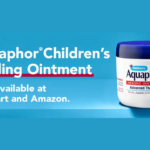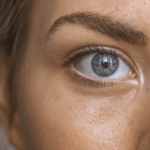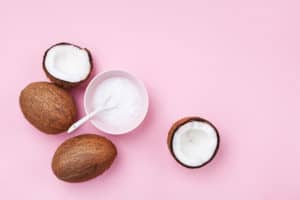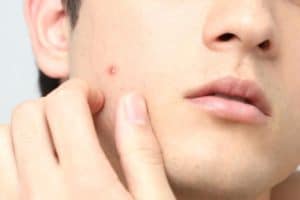I love eating nuts and seeds of all kinds, but I have noticed some make me breakout, whereas others don’t lead to a breakout. So this led me to conduct research on my own question: Can eating nuts cause acne?
Eating nuts can cause acne for some people. Avoid nuts that are high in omega 6 fatty acids and low in omega 3 fatty acids, such as peanuts. Eat high omega 3 nuts such as walnuts, pistachios, and brazil nuts to help prevent skin inflammation.
Some studies suggest that a high intake of omega-6 fatty acids relative to omega-3 may increase inflammation and the risk of chronic disease. So instead of peanuts, for example, look for nuts that are high in omega 3s.
Read on to learn more about the benefits of nuts.
Health Benefits of Nuts
Other than satisfying hunger with their high fiber content, essential fats, and protein, nuts help make the skin smooth and supple, along with giving it a natural glow. Nuts are largely under-rated nutritious snacks that can play a beneficial role in many people’s diets.
From walnuts to almonds, cashews, and pistachios, many nuts have something special to offer for your skin. Many nuts are filled with healthy minerals and vitamins like vitamin A, C, E, copper, and zinc. These all work to make your skin glow and look more smooth.
Can Nuts Cause Acne?
A question I’ve received a lot is, ‘Can nuts cause acne?’ The answer is it is not the actual food that directly causes acne. It is how the food affects the hormones which affect the sebum production or how much sebum or how thick the sebum is that can clog the pores.
This also explains why it is different for every individual. Hormones affect every part of our body, and they are very important in our day-to-day bodily functions as well as our appearance.
Hormones affect our body’s degree of weight gain or weight loss, skin thickness or thinness, how much and how thick or thin sebum we make, hair and muscle growth or loss. It is really not the food but how the food interacts with our hormones.
And the hormones affect how much oil that we make or how quickly our skin cell turnover rate is.
Check out the below video for some other tips on nuts and acne:
Increase Omega 3s
The typical American diet is overloaded with omega-6 fatty acids, the bad fatty acids. We need to include a lot more omega-3s in our diets. You will find that your body will respond less to those acne triggers because it neutralizes the effects of that.
In fact, studies have shown that when you eat a diet that is high in omega-6 and fats, it affects androgen, which is the male hormone.
For women, it increases an earlier onset of puberty. The earlier, the more likely they are to experience a little bit later in life severe acne. For both men and women, androgen levels increase the amount of oil they produce as far as how thick the sebum is, which then clogs the pores.
There are many other issues that can arise from eating a diet high in omega 6 and low in omega 3. Some of the more common autoimmune diseases that are related to this, in addition to acne, are arthritis, psoriasis, eczema.
Also, if you have a diet that is too high in fats, the common diseases are cardiovascular diseases, high blood pressure, and high cholesterol.
Eating a regular diet of omega-3 foods helps neutralize the foods that you love to eat even these foods tend to cause acne. This helps when you eat many omega-6 rich foods. It’s not causing a flood of inflammation throughout your body.
Other foods that should be eaten to combat inflammation include salmon, white fish, spinach, kale, and egg yolks, as well as hemp and flax seeds that are very high in omega-3.
Nuts That Do Not Cause Acne
Walnuts
Walnuts have three times the omega-3 (the good fatty acid) but six times the bad fatty acid, omega-6. This means it is great to include in your diet, especially if you consume a lot of high omega 6 rich foods.
They may be slightly bitter in flavor, but they are known to have anti-inflammatory properties, thanks to the omega-3 fatty acids. A handful of walnuts can increase your vitamin B levels that are particularly responsible for increasing your skin health by keeping age-related wrinkles minimized.
Pistachios
Pistachios are popular for keeping weight gain under control, but they are also filled with many heart-healthy fats that promote good cholesterol. Pistachios are also high in antioxidants that help block the growth of acne.
They help control blood sugar levels, which is important for diabetics and for keeping the acne-causing hormone androgen controlled to prevent breakouts.
Brazil Nuts
Brazil nuts are jam-packed with heart-healthy omega-3 fatty acids. They are also known for being an excellent source of selenium. Selenium greatly improves the skin’s elasticity and helps minimize and prevent inflammation which comes in the form of acne.
Brazil nuts also prevent free radicals from spreading in the body. This helps to keep the skin hydrated, youthful, plump, and blemish-free.
Almonds
Almonds are packed with essential fatty acids, protein, and fiber. Another big benefit is that they give your body a boost of vitamin E, which works by keeping your blood vessels dilated.
This helps keep the skin hydrated and protects the skin against acne breakouts and many other skin issues such as eczema, rosacea, and psoriasis.
Conclusion – Can Eating Nuts Cause Acne?
So can nuts cause acne? Yes, nuts certainly can lead to acne if you eat nuts high in omega 6, such as peanuts (which are actually a legume, not a nut). Eat nuts high in omega 3 instead to avoid getting acne.
My last note on the benefits of nuts in preventing acne is that there are three types of people that have no known history of acne. The first one is the rural villages of Japan, the Aceh tribe in Eastern Parkway, and the Catawba Islanders of Papua New Guinea.
Their diet is primarily plant-based, including a variety of nuts and seeds. They do not eat any processed food and are very low in animal protein consumption. They have no known documentation of acne ever.
This isn’t to say that by eating nuts, you will magically never have to deal with acne ever again. You still should follow a proper skincare routine with a good moisturizer, facial cleanser, enough sleep, and exercise.
But if you start including more of the right nuts into your diet, such as walnuts, pistachios, almonds, and brazil nuts, you should see a great benefit to keeping your skin acne and blemish-free.
Related Questions
What foods cause acne? Common foods that can cause acne include:
- Dairy products
- Whey protein powder (choose a vegan, plant-based protein powder instead such as Vegansmart Plant-Based Vegan)
Click here to see it on Amazon.
- Chocolate
- Refined grains
- Processed sugar
- White flour
What foods help with hormonal acne? A food that can help with hormonal acne is probiotics in supplement or food form, for example, kimchi, sauerkraut, tempeh, miso, kombucha tea, kefir. Probiotics help reduce gut inflammation and therefore help minimize and prevent acne.
Is almond milk bad for acne? There have been no studies showing that almond milk is a cause of acne. There have been many studies suggesting that eliminating cow’s milk from your diet can reduce acne; and therefore, using almond milk instead can be beneficial for your skin.









